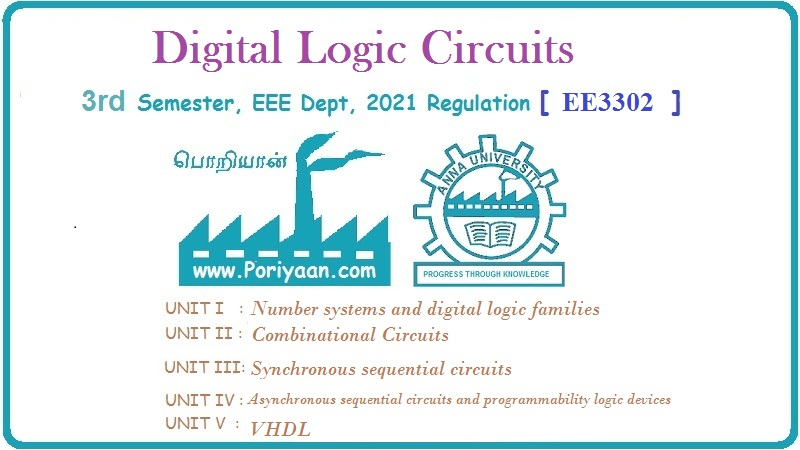Digital Logic Circuits: Unit V: VHDL
University Questions with Answers (Long Answered Questions)
VHDL | Digital Logic Circuits
Digital Logic Circuits: Unit V: VHDL : University Questions with Answers (Long Answered Questions)
University Questions with Answers
(Long Answered Questions)
(Regulation
2008)
Dec.-10
Q.1
Explain the design procedure of RTL using VHDL. [Section 10.19] [10]
Q.2
Write a note on testbenches. [Section 10.21] [6]
May-11
Q.3 Describe the RTL in VHDL. [Section 10.19]
[16]
Dec.-11
Q.4
Construct a VHDL module for a JK flipflop. [Section 10.14] [8]
Q.5
Explain in detail the design procedure for register transfer language. [Section
10.19] [16]
Q.6
Express how arithmetic and logic operations are expressed using RTL. [Section
10.19] [8]
May-12
Q.7
Write the VHDL code for mod 6 counter.[Section 10.15] [16]
Q.8
Explain RTL design using VHDL with the help of example. [Section 10.20] [16]
Dec.-12
Q.9
Briefly discuss the use of ’Packages’ in VHDL.[Section 10.2] [6]
Q.10 List and briefly explain different data
types supported by VHDL. [Section 10.6] [6]
Q.11
Write an HDL code that implements an 8:1 multiplexer. [Section 10.8] [10]
Q.12
How is memory modelled in VHDL ? Write a VHDL code that illustrates the read
and write operations of memory. [Section 10.18] [8]
(Regulation
2013)
Dec.-14
Q.13
Explain the concept of Behavioural modeling and Structural modeling in. VHDL.
Take the example of Tull Adder design for both and write the coding. [Section
10.3] [16]
Q.14
Write a VHDL code for a 4-bit universal shift register. [Section 10.16] [8]
Q.15
Write a VHDL code for a 4-bit universal shift register. [Section 10.17] [8]
May-15
Q.16
Write a VHDL code to realize a full adder using.
i)
Behavioral modeling [Section 10.3.1]
ii)
Structural modeling [Section 10.3.3] [16]
Dec.-15
Q.17
Write a VHDL program for full adder using structural modelling. [Section
10.3.3] [8]
Q.18
Explain in detail the RTL design procedure. [Section 10.20] [16]
May-16
Q.19
Explain the various operators supported by VHDL. [Section 10.6.6] [8]
Q.20
Explain functions and subprograms with suitable examples. [Sections 10.10 and
10.13] [6]
Q.21
Write the VHDL code to realize a 4 - bit parallel binary adder with structural
modelling and write the test bench to verify its functionality. [Sections 10.9
and 10.21] [10]
Q.22
Write the VHDL code to realize a decade counter with behavioural modelling.
[Refer
similar example in section 10.15.6] [8]
Dec.-16
Q.23
Explain in detail the concept of structural modeling in VHDL with an example of
full adder. [Section 10.3.3] [13]
Q.24
Write a short notes on built-in operators used in VHDL programming. [Section
10.6.6] [6]
Q.25
Write VHDL coding for 4 x 1 Multiplexer.
[Listing
10.8.2] [7]
May-17
Q.26
Design a 3 - bit magnitude comparator and write the VHDL code to realize it using
structural modeling. (Refer listing 10.9.8) [13]
Q.27
Design a 4 x 4 array multiplier and write the VHDL code to realize it using
structural modeling. [13]
Q.28
Write the VHDL code for the given state diagram, using behavioral modeling. [7]

Dec.-17
Q.29
Write a VHDL code to realize a full adder using behavioural modeling and
structural modeling.
(Refer
listing 10.3.1 and 10.9.4) [10]
Q.30
Discuss briefly the packages in VHDL.
(Refer
sections 10.2.4 and 10.2.5) [6]
Q.31
Write an VHDL coding for realization of clocked SR flip - flop. (Refer listing
10.14.1) [7]
Dec.-18
Q.32
Write a VHDL code to realize a half adder using behavioral modeling and
structural modeling.
(Refer
section 10.7.1 and Refer listing 10.9.2) [13]
Digital Logic Circuits: Unit V: VHDL : Tag: : VHDL | Digital Logic Circuits - University Questions with Answers (Long Answered Questions)
Related Topics
Related Subjects
Digital Logic Circuits
EE3302 3rd Semester EEE Dept | 2021 Regulation | 3rd Semester EEE Dept 2021 Regulation
